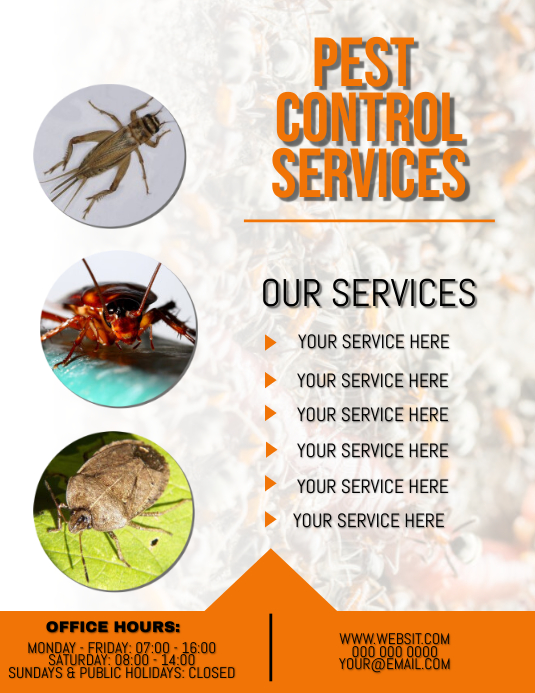Pest Control Auckland: Your Local Experts for Efficient Pest Management
Wiki Article
Understanding Different Types of Parasite Control Approaches and Their Effectiveness
When considering insect control methods, it is crucial to comprehend the diverse methods offered and their varying degrees of effectiveness. By exploring the subtleties of these pest control strategies, an extensive understanding of just how to attend to insect concerns can be created.Chemical Pest Control Techniques
Chemical insect control techniques play a crucial role in effectively taking care of and getting rid of pest invasions in different atmospheres. One of the crucial advantages of chemical bug control is its capacity to supply fast and targeted solutions to pest troubles. Pest Control Auckland.However, it is important to take into consideration the prospective dangers and disadvantages connected with chemical bug control approaches. Overreliance on chemicals can lead to the advancement of pesticide resistance in bugs, making them more challenging to control in the long run. Furthermore, making use of particular chemicals can have dangerous impacts on non-target organisms, the environment, and human wellness otherwise applied correctly.

Biological Insect Control Approaches
Utilizing natural predators and pathogens to handle parasite populaces effectively, organic insect control methods offer a eco-friendly and lasting technique to pest administration. By introducing or promoting the activity of organisms that naturally exploit or contaminate insects, such as ladybugs for aphid control or certain microorganisms for caterpillar infestations, organic control can aid maintain bug populations at workable degrees without the need for synthetic chemicals. This method is particularly beneficial for organic farming techniques, as it prevents making use of possibly dangerous substances while maintaining plant wellness.
Physical Parasite Control Methods
While biological bug control methods concentrate on harnessing all-natural killers and microorganisms, physical parasite control methods utilize physical and mechanical obstacles to take care of insect populations. These methods are usually thought about eco-friendly as they lessen the use of chemicals. Physical pest control consists of methods such as trapping, using obstacles like webs or displays, and literally eliminating parasites from the area.Traps are generally used in physical insect control to record and get rid of pests like rodents and bugs. Another physical technique is the usage of obstacles such as fencings, displays, or nets to stop parasites from getting in or infesting certain areas.
Natural Pest Control Methods
Integrating plant-based repellents and natural predators is a crucial method in applying reliable all-natural parasite control approaches. By urging the visibility of beneficial insects like ladybugs, lacewings, or predatory termites, garden enthusiasts can normally regulate pest populaces. These predators feed upon typical garden insects such as caterpillars, termites, and aphids, helping to maintain a well balanced ecological community without the demand for chemical treatments.
Additionally, implementing social practices such as click for more info plant rotation, friend planting, and maintaining appropriate plant health can additionally improve the performance of natural pest control techniques. These techniques not just help in protecting against insect problems however additionally promote biodiversity and total community strength. By integrating these all-natural methods, people can effectively handle pests while lessening ecological impact.
Integrated Bug Management (IPM) Technique
Implementing an Integrated Insect Monitoring (IPM) method is necessary for effectively managing parasite populaces while reducing reliance on chemical pesticides. IPM is a comprehensive and lasting method that combines various bug control approaches to achieve long-lasting options. This strategy focuses on monitoring, control, and prevention to resolve pest issues in an eco-friendly fashion.IPM incorporates biological, cultural, physical, and mechanical techniques with the restricted and critical use of look at more info chemicals when needed. By highlighting aggressive measures such as habitat modification, biological control, and exclusion, IPM intends to reduce pest populations and their impact on the community. Regular monitoring is vital in IPM to analyze parasite degrees precisely and figure out the most suitable control methods.
Among the vital benefits of IPM is its capability to reduce the risks associated with too much chemical use, such as environmental contamination and injury to non-target microorganisms. Furthermore, IPM promotes a more all natural technique to pest administration by considering the overall ecological community characteristics. In general, the IPM strategy uses a efficient and sustainable remedy for insect control while advertising ecological duty.
Verdict
In conclusion, recognizing the various types of parasite control approaches and their efficiency is important in successfully taking care of bug infestations. Chemical, biological, physical, and natural insect control approaches each have their own benefits and restrictions. Integrated Insect Monitoring (IPM) technique, which combines various methods for sustainable bug control, is progressively being recognized as a environmentally friendly and all natural service. By making use of a combination of these people, companies and methods can effectively manage parasites while lessening harm to the atmosphere.Chemical bug control approaches play a critical duty in efficiently taking care of and getting rid of pest invasions in various settings.Making use of natural killers and pathogens to manage bug populaces effectively, organic parasite control techniques provide a sustainable and eco-friendly strategy to pest monitoring. By presenting or promoting the task of microorganisms that naturally prey on or infect pests, such as ladybugs for aphid control or particular germs for caterpillar invasions, biological control can assist keep bug populations at manageable levels without the requirement for synthetic chemicals.While organic insect control methods concentrate on utilizing all-natural predators and microorganisms, physical pest control techniques use physical and mechanical barriers to handle bug populaces. Integrated Parasite Administration (IPM) method, which incorporates various techniques for lasting parasite control, is progressively being recognized as a eco pleasant and holistic service.
Report this wiki page